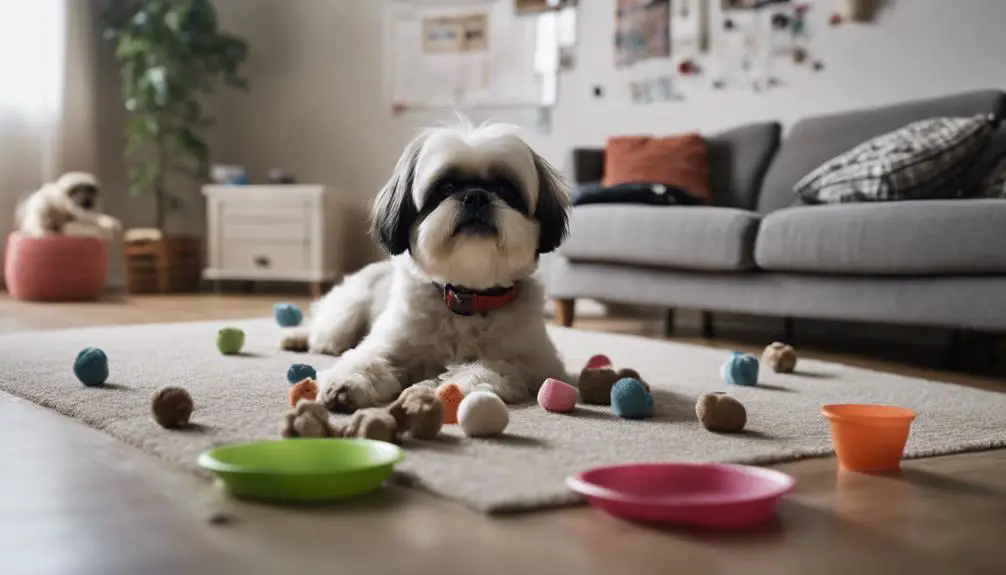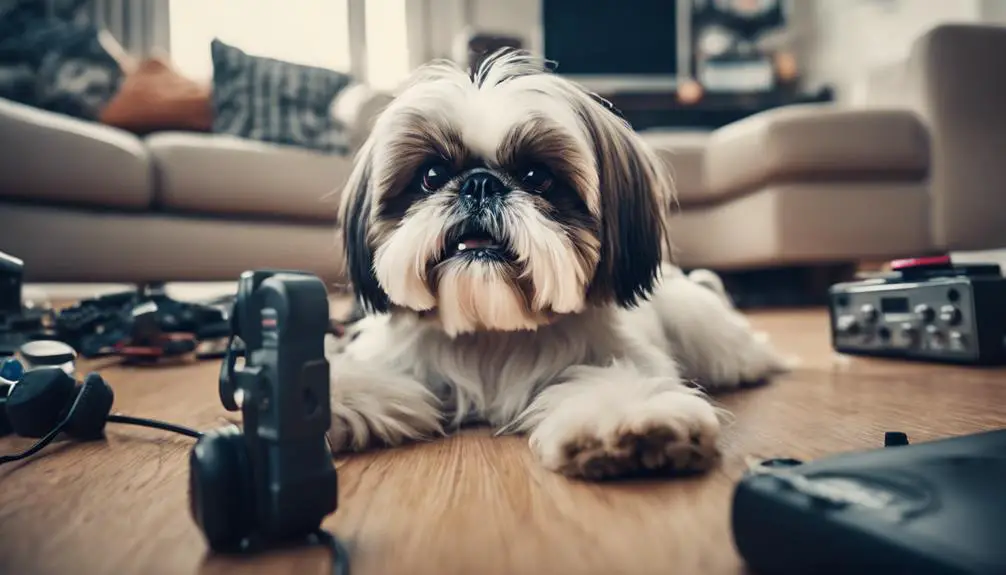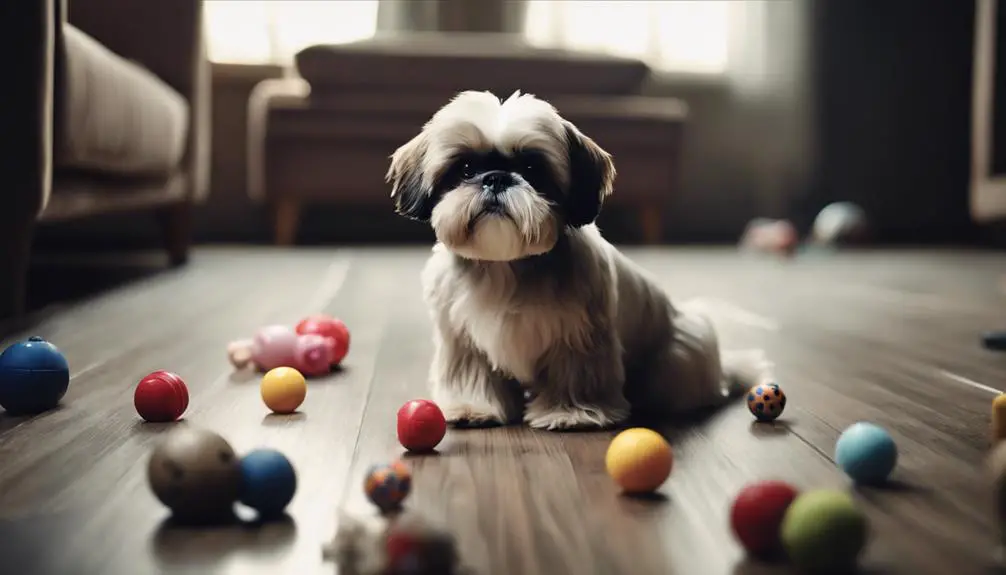When you're training your Shih Tzu, you might inadvertently adopt some methods that seem effective but could actually harm their development and trust. For example, using physical punishment isn't just cruel; it may backfire, leading to fear and aggression rather than obedience. Similarly, bombarding your pup with too many commands at once can overwhelm them, making it harder for them to learn anything at all. Let's explore why these strategies fail and discuss better alternatives that respect your Shih Tzu's unique temperament and needs. What might be some effective ways to foster a positive learning environment for your furry friend?
Using Physical Punishment

It's important to understand that using physical punishment is never an effective method for training Shih Tzus, or any dog for that matter. When you guarantee to physical punishment, it doesn't teach your Shih Tzu what behavior you want. Instead, it often instills fear, leading to anxiety and potentially aggressive behaviors. This isn't the path to a trusting and loving relationship.
Instead, focus on positive reinforcement. This technique rewards the behavior you want to see, such as sitting or staying, with treats, praise, or playtime. It's about encouragement rather than punishment. You're not just avoiding harm; you're actively promoting good behavior and strengthening your bond with your pet.
Remember, Shih Tzus are particularly sensitive to tone of voice and body language. They respond far better to cheerful encouragement than to harsh reprimands. Consistency is key in this approach. Make sure everyone in your household is on board with this method to avoid confusing your furry friend.
Training should be an enjoyable experience for both you and your Shih Tzu. By using positive reinforcement, you create a positive learning environment that's conducive to both teaching and strengthening the emotional connection between you.
Overloading With Commands

You'll hinder your Shih Tzu's learning if you bombard them with too many commands at once. It's important to understand that your furry friend's ability to process and retain information is limited by their short attention span and individual pace of learning.
Imagine how you'd feel if someone threw multiple instructions at you simultaneously — overwhelming, right? Similarly, your Shih Tzu can feel stressed and confused.
Instead, adopt a step-by-step approach. Start with one basic command, such as 'sit' or 'stay,' and only introduce a new command once your pet has mastered the first. This method not only eases the learning curve for your Shih Tzu but also boosts their confidence as they achieve each milestone.
Remember, training sessions should be short and sweet. Aim for five to ten minutes each time, especially during the initial stages. Long sessions can tire both you and your dog, reducing the effectiveness of the training.
Always end on a positive note, with a command your Shih Tzu knows well, to make sure they associate training with a positive experience.
Neglecting Positive Reinforcement

Neglecting to reward your Shih Tzu's progress can severely hinder their learning and enthusiasm for training. Remember, your little companion thrives on encouragement and acknowledgment. When they perform a command correctly or show a desirable behavior, immediate positive reinforcement is essential. This could be in the form of treats, praises, or a gentle pat. Each time you respond with a reward, you're reinforcing the behavior you want to see more often.
Without this positive feedback, your Shih Tzu might feel confused about what you expect from them. They're likely to become disinterested or stressed, making training sessions less effective and far more frustrating for both of you. Think of it this way: positive reinforcement isn't just about giving treats; it's about building a bridge of communication and trust between you and your pet.
Make sure to vary the rewards to keep things exciting. Not all Shih Tzus are motivated by the same things. Some may prefer a chunk of their favorite snack, while others might value a quick play session or a verbal 'Good boy!' or 'Good girl!' above all else.
Tuning into what makes your furry friend tick is key to a successful and happy training experience.
Maintaining Inconsistent Rules

While positive reinforcement is key to their development, you also need to make sure that your rules remain consistent to avoid confusing your Shih Tzu. Imagine if you're sometimes allowed to eat on the couch and other times scolded for it; you'd be pretty baffled, right? That's exactly how your Shih Tzu feels when you flip-flop on the household rules.
Inconsistency can lead to anxiety and behavioral issues in your furry friend. You've got to be clear about what's allowed and what's not. If jumping on the couch is a no-go, then it should always be off-limits, regardless of the situation. This clarity helps your Shih Tzu understand and abide by the rules, making them feel secure and well-behaved.
Remember, every time you change the rules, you're basically starting from scratch, which can be incredibly frustrating for both of you. To stay consistent, it's helpful to write down the rules you've set for your pet. This way, everyone in your household is on the same page and your Shih Tzu isn't receiving mixed signals.
Consistency is comforting to dogs, and by maintaining a steady set of rules, you're setting your Shih Tzu up for success.
Relying Solely on Verbal Commands

Although verbal commands are important, they shouldn't be your only training tool when teaching your Shih Tzu. Shih Tzus, like many dogs, respond well to a mix of signals. Relying solely on words can lead to confusion, especially in noisy environments or as your dog ages and their hearing mightn't be as sharp.
You've got to integrate hand signals and body language into your training regime. These visual cues can help reinforce the verbal commands, making it clearer for your Shih Tzu to understand what you're asking. For instance, a simple hand gesture can accompany the verbal command 'sit' or 'stay,' providing a clear, consistent cue that your dog can follow more easily.
Also, consider the benefits of using rewards like treats or favorite toys. Positive reinforcement isn't just about verbal praise; it's about making the learning process enjoyable and effective. When your Shih Tzu successfully follows a command, immediately rewarding them helps cement the behavior.
Keep your training sessions short, fun, and varied. This way, your Shih Tzu stays engaged and doesn't become reliant on just one form of communication from you. Remember, a well-rounded approach adapts to your dog's changing needs and abilities as they grow.
Avoiding Socialization Training

Skipping socialization training can set your Shih Tzu up for behavioral challenges later on. It's important to understand that these adorable furballs aren't just going to pick up social cues on their own. They need your help to learn how to interact with people and other animals in a healthy way.
If you neglect this aspect of their training, you're likely to face issues like excessive barking, aggression, or fearfulness, which can be a nightmare to handle later.
Start socializing your pup as early as possible. Introduce them to a variety of environments, sounds, and beings. Take them to the park, let them meet other dogs and people, and expose them to different situations under controlled conditions. Remember, it's not just about quantity but also the quality of these interactions.
Always observe your Shih Tzu's reactions. If they seem overwhelmed, take a step back and try a more gradual approach. Positive reinforcement is key here; reward them for good behavior to reinforce these positive encounters.
Conclusion
As you train your Shih Tzu, remember to steer clear of harsh methods. Don't resort to physical punishment; it only breeds fear.
Avoid bombarding your pup with too many commands at once, and don't forget the power of positive reinforcement.
Consistency is key, so keep the rules clear and steady.
Expand beyond just verbal cues and importantly, don't skip out on socialization.
With patience and understanding, you'll foster a well-behaved and happy companion.


